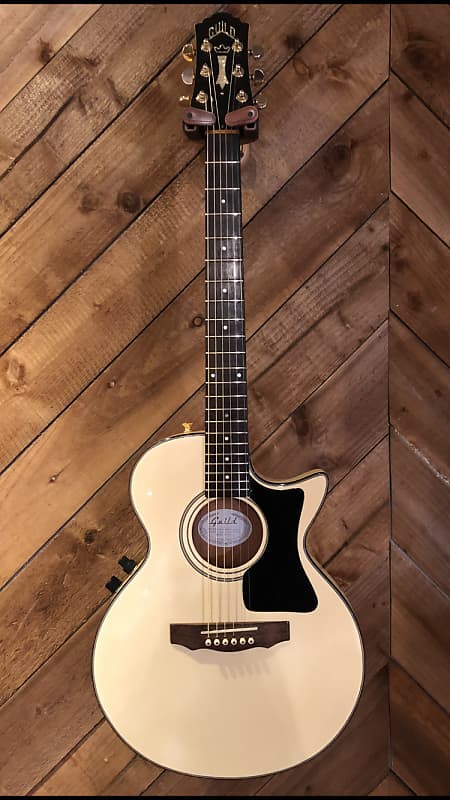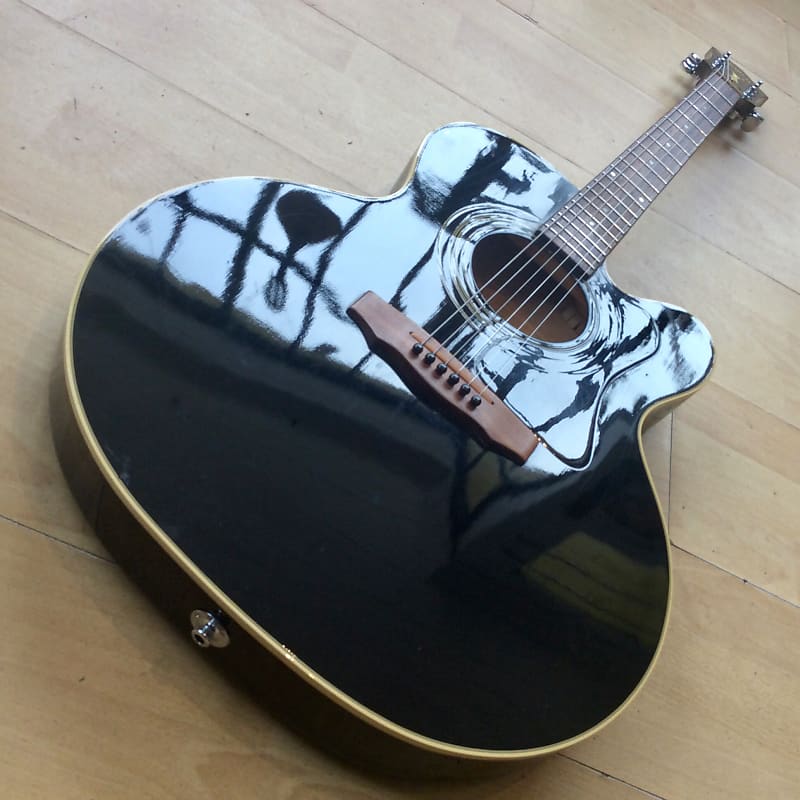Thank you. I kinda got that feeling, but you never know if you got lurkers that are gonna swoop in and be a jerk... but everyone has been really warm from the get go. I only signed up with the intention of getting my question answered, but everyone has been so nice I've kinda stuck around.
So, yeah, it's a "prestige" being sold outta the UK. Seller claims it's a limited run but who knows how true that is...
This Guild Standard Prestige was made in America in1992.These are extreemly rare guitars .There were only 172 made from between 1990 and 1992 and we think there may not have been any others sold in the Uk. It's slim, lightweight body,(only 2.5inches deep) and narrow, shortscale neck makes it incr...

reverb.com
[/URL]
Prestige Series was a different guitar altogether from Songbird, but probably much better choice for unplugged use. It was a traditional acoustic back and sides type build.
In case you didn't see it, here's a
short (

) thread with good background on the model, and Ralf notes they're only 2.5" deep, although 16" lower bout. In fact, is it the same guitar?
Black prestige in England https://reverb.com/item/37117765-guild-prestige-1992-black-gloss?utm_content=feed_listings&utm_source=braze&utm_medium=email&utm_campaign=Daily-Feed-Email&utm_term=Feed%20Email

letstalkguild.com
Ever since I first saw 'em I always thought they were a transitional model between the granddaddy F45ce and the later "Fxxce" series, but you should give that size a try for comfort, it may surprise you as I mentioned earlier.
But although pretty low production (a lot fewer than Songbirds), it wasn't a "limited run" in the sense that Guild announced they were only going to make so many, like the GSR models out of New Hartford. It was "regular production", just very low numbers even by Guild's already relatively small output standards.
And in spite of my previous "advice", yeah, to me, that's "too much" for a Prestige no matter how scarce. As well, at that age it should be thoroughly checked for possible need for neck re-set.
My Tech is very adamant that I don't pay over 1k for one of these guitars (he's a professional musician and been a Luthier for over 30 years). I told him about the advice from some here on the board about checking ending/sold prices on reverb and ebay to get an idea of the going rate... He said, "That sounds like good advice on the surface, but we all know there's a sucker born every minute, and all you're doing is looking lists of people who got ripped off if they paid over 1k..." He's a funny guy, but I think he makes sense. I mean the guy's a luthier, he's gotta know what he's talking about. A mechanic can you tell you a car's worth better than a salesmen.
So, yeah, long winded answer.

Multi-faceted subject.

So your luthier's obviously got your best financial interest in mind, but no snark intended, just because he's a luthier doesn't mean he's "Gotta know what he's talking about" when it comes to
current market. Does he know of any recent sales in the price range he believes is appropriate? (And I don't actually disagree with him, he may know something that doesn't show up on sold price lists, for example)
Those sold listings are exactly how Blue Book values are derived when it comes to cars (and guitars), to continue that simile.
And if there's only one of a piece sold in the year prior to the BlueBook, that piece sets the "market price" as suggested by the Blue Book. So your luthier thinks the market's too high and he could well be right.
It could fall in 6 months after Covid's brought under control. Sellers might realize that potential customers have much more freedom to shop again and aren't constricted to internet purchasing. Also think the samples we've seen in this thread so far are definitely priced with a "scarcity" premium which for example in the case of that Prestige, simply isn't justified in my opinion.
Just because they're scarce doesn't mean they're more desirable. In 6 months they may decide it's time to sell that piece which is tying up inventory dollars even if they have to lower their price.
Part 2: I might knowingly pay more than "market value" for a piece in known excellent condition that I can play immediately, as opposed to buying something I know needs work but fits in the budget and possibly spending "more than it was worth" by the time it's properly repaired.
Other guys love finding old pieces in need of work and getting 'em properly refurbished or restored. So there's also that issue that different types of buyer are looking for different condition instruments, bringing us back to what is
condition worth?
To me that's where having a trusted luthier as value that may influence what you're willing to pay.
And
how long are you willing to wait? I'd be kind of surprised to see a $7-900.00 Songbird in VVG condition come around again, but we get surprised here all the time.



